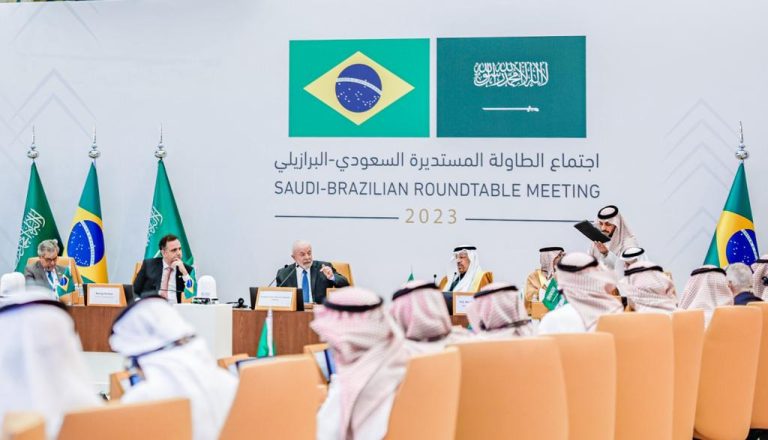Riyadh – “I want to say that in ten years, the world will say that if Saudi Arabia is the most important country in oil and gas production, Brazil will be called the Saudi Arabia of green energy and renewable energy – because that is what we are working for,” declared Brazilian president Luiz Inácio Lula da Silva at the closing of the Saudi Arabia-Brazil Roundtable Meeting, an event held this Wednesday morning (29) at the Ritz-Carlton hotel in Riyadh, which brought together businesspeople and government authorities from both countries.
Lula said he has signed commitments, such as reducing deforestation by 2030. “We want to reach zero deforestation in the Amazon. Secondly, as Rui Costa, Fernando Haddad, and other ministers said, we will do everything possible to make Brazil the center of the world in the production of alternative energy because I think we all need to work very responsibly to decarbonize the planet, so that we can live in a more dignified way, with a better quality of life and without fear that we are destroying the place where we live,” he said.
The president highlighted that Brazil already has examples to show the world, with an energy matrix that is primarily renewable and significant advancements in alternatives to fossil fuels and pollutants, such as wind, solar, and hydroelectric energy, and the potential to produce green hydrogen.
Lula’s speech at the event encompassed social development, reducing inequalities, creating jobs, and energy transition. The president launched the challenge of building partnerships between Saudi and Brazilian businesspeople to generate development and employment in both countries.
Lula also spoke about the prospects for investment and growth in Brazil in the coming years, in which the country will be in the international spotlight by hosting major global events, such as the G20 and BRICS summits, in addition to the United Nations Conference on Change Climate Change (COP30), scheduled for 2025 in Belém, in the Amazonian state of Pará.
“I count on Saudi Arabia not only to help us organize the G20 but to help organize COP30. These are opportunities to reduce cultural differences between us and share development and investment policies,” he said.
He highlighted that COP30 would be an opportunity for the world to get to know the Amazon, not only for all its mineral and biodiversity riches but also for the people who live in the region. “The whole world talks about the forest, about Brazil’s fresh water. But the world will really get to know what the Amazon is, not just the millions of trees it sees when it flies by. Down there, there are many precious minerals still unexplored, the richest biodiversity on planet Earth, and also men and women who need to survive. They are fishers, riverside communities, and indigenous people – Brazilians who need the Amazon, in addition to being preserved, to be given the possibility of survival and have decent living conditions,” he said.
The Brazilian leader emphasized that solutions through diplomacy and agreements drawn up at negotiation tables are always more effective in building a better future for humanity, as opposed to wars that have not only generated deaths and destruction but brought economic consequences to the planet.
“Wars bring nothing but misery and death and the destruction of what people built with much sacrifice. I entered into politics with dialogue. It is cheaper, more sensible, and more effective to spend hours at a negotiating table than to kill children, women, innocent people, and men,” declared the president.

Lula explained the concept of partnership – not only interest in what Brazil can sell to Saudi Arabia but what the country and businesspeople can acquire from the Arabs to foster economic and social growth for both sides.
“We are interested not only in learning how much Saudi Arabian funds can invest in Brazil but also how much Brazilian businesspeople can invest in Saudi Arabia. This exchange and this new way of doing foreign policy could change the face of world trade a little,” he said.
Lula called on businesspeople from both countries to dream big. “When I took office as president in 2003, we had less than USD 100 billion in trade balance. If Brazil takes on the responsibilities given by its size and importance in geopolitics, it could achieve a balance of USD 1 trillion in 2030. We can do it if we believe. You have to dream big, the size of Saudi Arabia and the size of Brazil,” he said.
During the event, the president of the Brazilian Trade and Investment Promotion Agency (ApexBrasil), Jorge Viana, said that Invest Saudi wants to open a branch office in Brazil and invited ApexBrasil to have an office in Saudi Arabia.
The Saudi Minister of Investment, Khalid Al-Falih, announced that the Future Investments Initiative (FII) will be in Brazil in June 2024 as a gateway to Latin America. The event is a global platform that brings together the world’s leaders, visionaries, and innovators to explore the future of global investing.
“Today, this meeting means constructing a new story in the relationship between Brazil and Saudi Arabia,” declared the president.
Translated by Elúsio Brasileiro




